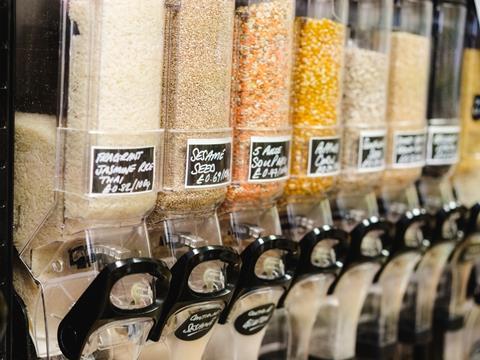
Danone, Nestlé, PepsiCo, The Coca-Cola Company, and Unilever have contributed to a new Ellen MacArthur Foundation study suggesting that, if scaled up effectively, returnable packaging can be as economically attractive as single-use alternatives.
Titled ‘Unlocking a reuse revolution’, the study identifies particular beverage, fresh food, food cupboard, and personal care products and examines the potential benefits of collaborative, large-scale efforts to package them in plastic reusables.
It was developed in partnership with Systemiq and Eunomia and features input from over sixty organizations, including the European Investment Bank, as well as national governments, reuse experts, and major brands and retailers.
According to the Foundation’s ‘Global Commitment Five Years In’ publication, the world’s virgin plastic use is unlikely to decrease from current levels before 2050 without a ‘significant shift’ towards reuse, and scaling such systems is said to be an essential facet of tackling the plastic waste and pollution crisis.
The new study asserts that, in the most ambitious scenario, returnable plastic packaging – i.e., packaging that is returned by consumers after use, professionally cleaned, and refilled for further sale – could lower greenhouse gas emissions and water use by 35% and 70% in comparison with single-use plastics.
Therefore, the Foundation believes that leaders in the private, public, and finance sectors should ‘take a fresh approach’ by adopting reuse through shared infrastructure and packaging standardization and joining forces to achieve high return rates.
It also looks to the European Packaging and Packaging Waste Regulation, alongside ongoing negotiations for a Global Treaty to End Plastic Pollution, to enforce ambitious reuse policies and the necessary conditions for their success. This includes time-bound, sector-specific reuse targets.
Sander Defruyt, Plastics Initiative Lead at the Ellen MacArthur Foundation, commented: “It’s time for a reuse revolution. Embracing this gives us the opportunity to tackle plastic pollution, ease pressure on our natural resources, and make strides towards net zero.
“Scaling reuse will be a major transition and won’t happen overnight. This analytical study gives us greater insight into the key drivers that affect the environmental and economic performance of return systems. Yet, it doesn’t have all the answers. We now need to see more research and groundwork in specific geographies and sectors to determine the best course of action and make return models at scale a reality.
“No single organisation can drive the necessary change by itself; it will require a collaborative effort from businesses, policymakers and financial institutions. Together they can kick start the reuse revolution and get the world on track to tackling the plastic crisis.”
“This valuable study issues a blueprint for achieving the crucial step-change from recycling to reuse in a global economy,” continued Ambroise Fayolle, vice president at the European Investment Bank. “Shifting towards reuse systems can increase circularity at scale, whilst at the same time creating new business options and social benefits.”
Jolanda de Rooij, senior sustainability manager Circular Economy at Unilever, added: “We’re pleased to be working with the Ellen MacArthur Foundation and other industry partners to explore the economic, environmental, and experiential impacts of reuse models versus single-use.
“Getting these models working economically at scale, however, will take time and will require significant collaboration between retailers, manufacturers, policymakers, and civil society. Fragmented efforts will not be enough to drive the necessary systems change.”
In related news, the Foundation recently joined Reloop, Zero Waste Europe, TOMRA, and others in signing a position paper calling for a clearer definition of reusable packaging and the implementation of complementary refillable solutions in the Packaging and Packaging Waste Regulation.
As the plenary vote for the Regulation approaches, UNESDA has also joined forces with various European organizations to sign a letter calling for reusable and single-use recyclable packaging to become complementary.
Meanwhile, Planet Reuse and the New European Reuse Alliance (New ERA)’s rEUse campaign seeks to establish balanced reuse systems in a range of sectors to meet the mandatory reuse targets set by the EU Commission.
If you liked this article, you might also enjoy:
The L’Oréal approach to packaging sustainability
The way we talk about plastic needs to change – here’s how to get it right
What steps is Apple taking to make its packaging more sustainable?













No comments yet